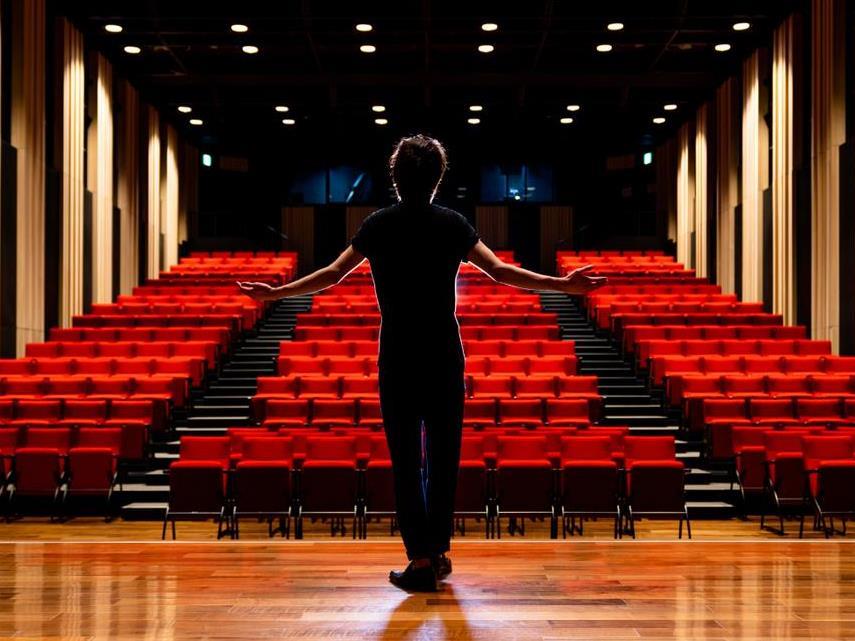Image: Shutterstock.com
Auditions, as any actor knows, can be terrifying. Whether you’re part of an open call, or meeting the director and casting director one-on-one, it’s hard to shake off the feeling that you’re being judged – let alone perform at your best under unusual, often challenging conditions.
Here, actors from across the country and for all parts of the sector share their advice about making the most of the experience.
JOSH PITERMAN
What advice can you offer your colleagues about acing an audition?
‘There’s no real trick. You’re going to be nervous regardless and that’s all a part of it. So embrace it. But I think if you can get out of the mindset of being “right” and into a mindset of “what’s my most interesting and compelling version of this character?” that will definitely take the pressure off and create a good focus in the room.’
What do you wish you’d known about the audition process when you were starting out as a performer?
‘That the process is far more important than the result.’
What advice can you offer your peers today about making the right impression at their next audition?
‘Be gracious, be humble, take the direction and enjoy the opportunity.’
Josh Piterman is one of the principal cast in Beautiful The Carole King Musical, now showing at QPAC until 2 September.
CHI NGUYEN
What I wish I’d known about the audition process when I was starting out:
‘Auditions are not personal. When they don’t give you a call-back, it’s not always because you are a bad actor. Most of the time it is because they have a very specific idea of what they want for the character and you just don’t fit that, and that’s ok. It’s like you can cook the best soup dishes ever but they are specifically wanting salads. Don’t be discouraged. Consider auditions as professional milestones, not a reflection of your worth as a human being. Keep trying and someone will fall in love with your soup.
‘Being able to throw away your preparations and take in new directions on the spot is as important as being prepared for the audition. After you perform what you rehearsed, if the director gives you a chance to perform it again with new directions on intention/speed/tone/action – it is very important that you become flexible and take on those directions with bravery, flexibility and a sense of play. A good actor is someone who prepares, but a great one is someone who can shapeshift on the spot and refuse to fall into a pattern because of what they have rehearsed.
‘Casting directors do want you to do a good job.
‘If you feel like you did a bad audition, the auditioners don’t know that, so don’t express it or give it away. In fact, there are so many stories out there of people thinking they do a bad job but who turn out to be the best auditionee and end up getting the roles. So just keep it together. You have given them a great gift by performing your work, regardless of outcome.’
Some advice to my peers on making the right impression at their next audition:
‘Confidence is a great first impression. And here is how you have it. Come into the audition room knowing that you are of equal status to the auditioners. Don’t apologise for your work. Find your feet. Keep your head high. Imagine you already got the part and you are just performing your audition again to people who really like your work.
‘Don’t confuse confidence with arrogance.
‘Be friendly. They are more likely to book you if they think you will be pleasant to work with. Be open and genuine, make an effort to learn their names, smile, be polite. But don’t kiss up to them; there’s a difference.
‘To prepare for your audition, search up the casting directors’ names and past works. Watch them. This research will help inform you about their styles and the types of actors they want to work with, which will be helpful to keep in mind when you shape your audition.
‘You want to stand out and be unique in your audition, but not in your paperworks. Your CV and headshot must be up to industry standard and stay within structure. This will express professionalism. Almost all auditions will require you to print in a copy of your CV and headshot so consult with your agents to make sure these documents are of great standard.’
Chi Nguyen can next be seen in Hallowed Ground at La Mama Courthouse, 8-19 August.
GREG STONE
‘Auditioning can be stressful at any age or stage of a career. My advice is fairly simple: treat your audition as if you already have the job. Don’t try to second guess the auditionees. Know your lines. (Which can be difficult if they only give you 24 hours!). Try not to “do what you think they want”, rather make a personal connection to the scenes and character, make a few choices and present that. Be prepared to explore and change in the room with the director. (They will want to see how you respond to direction).
‘When you walk out, let it go, trusting you have done the best you can do – and hopefully nerves haven’t got the best of you. It’s now out of your hands….’
Greg Stone is performing in MTC’s An Ideal Husband at Arts Centre Melbourne from 16 July-25 August.
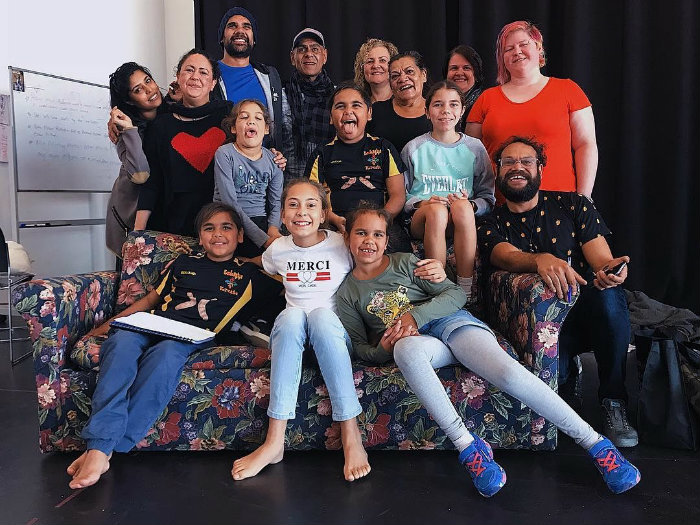
The cast and crew of Black Swan State Theatre Company’s upcoming production, Skylab, gather in the rehearsal room, with Gary Cooper in the back row, second from left. Image supplied.
GARY COOPER
‘When I originally auditioned for WAAPA, I was fortunate to have Jon Saunders go over my monologue pieces. I was actually the first Aboriginal actor to graduate from WAAPA and for the first few years went to many auditions. I prepared, learnt the script, researched the company and director. In the case of auditioning for a Wim Wenders film, I made sure I watched a few of his movies so I could talk about them. I’ve also found it useful working with another actor, going over the script, as you can play and try things out in a safe environment. It’s great to assist other actors with their auditions. For Skylab I actually was based in Kalgoorlie so sent an audition tape. Again, I learnt the script and wanted to send the best quality tape. I didn’t just want to do it on my mobile, so asked a friend who had a film background. We shot the audition tape outdoors with the stunning goldfields as the backdrop. We then uploaded it to YouTube for both Black Swan and Yirra Yaakin to view. I’m really thrilled and honoured to be involved in this production.’
Gary Cooper plays Uncle Harvey in the upcoming Black Swan/Yirra Yaakin co-production, Skylab, running from 16 August – 2 September at the State Theatre Centre WA.
EMILY THOMAS
‘For me the biggest lesson as an actor over the years has been to stop reaching and grasping for anything that you think casting want to see in the role or in the piece. Rather than having ideas about what you think casting want you to be, follow your personal instincts and responses to the brief or script. Most actors are going in with the thought “Hamlet is like this, so that is what I should try and reach for,” and casting directors will see 100 actors playing the exact same “idea” of Hamlet. Then there is that one actor who walks in and has asked the question of themselves, “How would I actually would react to this situation, conflict or relationship?” The actor happens to laugh in a moment where the rest reached for sadness for example. They get the job because not only are they surprising and refreshing next to the other 100 actors, but also because they are authentic and human. We can see ourselves reflected in them. When I realised this I was not only more comfortable in my own skin, but I was somewhat liberated from audition angst. My thought process became, “Well, this is my Hamlet. If they don’t want my Hamlet, then I’m not the actor for the job. Simple.”
‘Also, any audition is already an opportunity to act full stop, not just an opportunity to get a job! Whether it’s your first audition today, this month, this year, you get a chance to be in your craft. Lucky you! It’s very attractive when you enjoy it and go in to do the job, not get the job. You are already at work on the piece rather than just hoping for it. What director wouldn’t want that?!’
Emily Thomas is performing in OpticNerve’s Polygraph at Theatre Works until 29 July.
Benj D’Addario
‘I enjoy auditions. They are an opportunity. Early in my career an upcoming audition would dominate my day/week as I learnt lines and overly speculated about “what they were looking for”. Time has shown me that success comes from preparation, choice-making and a little bit of luck. It is healthy to know that when you enter the audition room everyone wants you to succeed, they want you to be the one they are looking for. As much as possible – know your lines and the context of the piece: know them well enough to be flexible with them. Come in with a choice: present it with conviction, and then let it all go if asked to. Be on time, breathe, make eye contact and be yourself. I have been on both sides of the audition table, and I know that showing yourself as someone who is great and collaborative to work with – as well as great at the work – makes a huge impression.’
Benj D’Addario can next be see in Threshold, presented by The Blue Room Theatre and The Boston Curse, from 7-25 August.
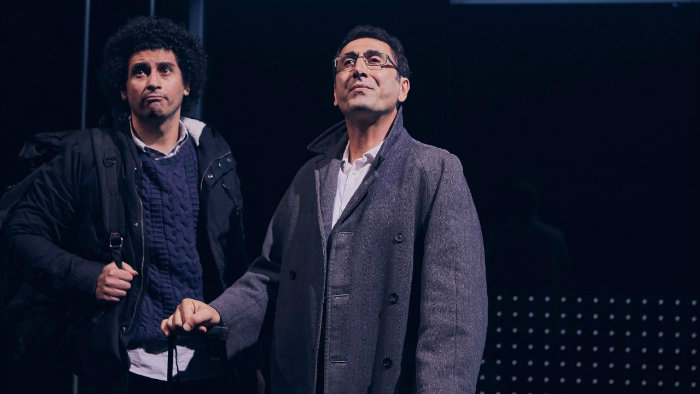
Osamah Sami and Rodney Afif in Good Muslim Boy. Photo credit: Tim Grey.
RODNEY AFIF
‘There are many variables at play in measuring the success of an audition. “Acing” an audition might suggest you’ve landed the part, but you can still be successful in achieving other goals, even when you don’t get the part.
‘Know the scene well. It’s impossible to rehearse an audition scene in the true sense of the word. The audition room will almost always present differently. The reader will be on the opposite side. You’ll be asked to stand rather than sit etc.
‘Still, try to control the room as much as you can, to replicate the conditions you practiced in at home. Try getting one take down before the casting director or director discusses the scene with you. It’s preferable to do your first take without being cross-motivated by having to hit marks. Lastly, I have started requesting that casting agents respond to my audition whether I have been successful or not. I believe actors are owed that courtesy.’
Rodney Afif is currently performing in the Queensland Theatre/Malthouse Theatre co-production, Good Muslim Boy, until 4 August at the Cremorne Theatre, QPAC.
PETA BRADY
‘I find there is no secret to “acing an audition”.
‘I start with character. I will bumble around with who I think they might be after reading the script. Why are they there? What’s their function in this? Then I start learning what they say. Why they say it. Knowing my words back the front helps so that I can play and try and find their heart beat.
‘Then there’s the audition. Trying to hold onto what I have prepared and not be dragged into the energy of the room I’m entering and letting anxiety run away or repress organic offers.
‘I do find whilst auditions can be a great process for the director and they get to see a range of offers, it does force the individual actor to make early decisions because you are striving for some kind of end point.
‘It takes a good director to be able to see you might still get there if you aren’t there already. You have to make choices early that can be hard to shake if you are lucky enough to land the gig. Choices you’ve had to make before you know the material intimately. Before you have a great knowledge of style or a deep understanding of the text.
‘Actors are sponges. We take what we think we need to get there and use it. Sometimes it can be hard to remove. Like soup. Too much of one ingredient can tip the whole soup into something too strong, weak, weird tasting. Try removing an ingredient from soup. You can’t. You just keep adding spices to even out the flavour, right?!
‘I find it insulting to be not given the whole script (all the time with TV – as confidentiality and protecting scripts trumps letting the actor in on the whole picture – but expect them to come in and know their place. Somehow. That’s a whole other ball game.) If you are going to audition an actor, give them the whole script and not the night before. Be aware of process. We are not robots. We work hard. We’ve already spent days on it before we enter your room. Play with us. Don’t expect the complete character to walk into the room.’
Peta Brady is currently performing in SHIT at HotHouse Theatre until 21 July 2018.
Alex Beauman
‘What I wish I knew about auditioning when I first started is that you and your self-worth are not dependent on booking this job. I used to go into audition rooms reeking of desperation and I’d let nerves overpower me. But by giving myself this sense of perspective it helps to ground me in the moment and allows me to connect with the material – not the outcome.’
Alex Beauman is currently performing in You Got Older at the Kings Cross Theatre until 4 August.
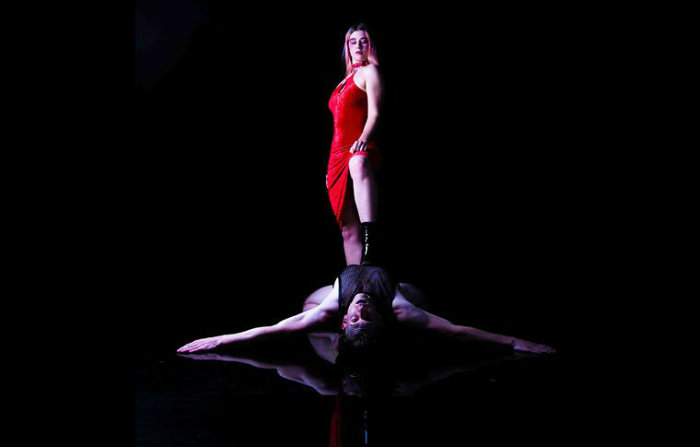
Publicity image for Unveiling: Gay Sex for Endtimes via blueroom.org.au.
ANDREW SUTHERLAND
‘I don’t think I audition very well, but if we ignore that: preparation, obviously, but openness and humility. Don’t be an egotistical dick about yourself, but do engage and be aware that you have an offering and an identity as an artist. You may not be in control of auditions, but you are still sculpting your body of work. I distinctly remember an audition, not long after graduating drama school in Singapore, in which after a particularly uncomfortable redirection and hearing about the intentions and rationale of the work, I told the creative team that it wouldn’t be appropriate to hire me. I was then offered a role – which, for the same reasons I felt in the audition, I turned down. And that work was far better without me.
‘I think it’s good to remember that getting a role is less important than defining a trajectory and integrity as an artist. And sometimes you can clearly recognise who you want to work with (either within or outside of an audition context, and from either side of the “table”). For Unveiling, assembling a team had everything to do with meeting and identifying each other as the right broth of artists, and nothing to do with nailing a monologue. Michelle Aitken joined the team as an assistant director and became so essential that she had to be in the show. For godeatgod, which I directed at the Blue Room’s Summer Nights program earlier this year, I asked Mindy Min-Swe to perform while watching her sewing: her inner life, the nature of her concentration in that action, was enough to tell me she was necessary to the work. These connections run a lot deeper than “audition techniques”.
‘Having said that, I do think that the young companies and collectives that sprout up in indie theatre-making scenes should be auditioning more, particularly if they generally come from the same training background. Cross-pollination is the key to growth. Back to actors and the advice I am not qualified to give: I suppose you should just go in like a human, be as capable as you can inside all of your excellent inadequacies, and if (when?) you don’t get the role, take no more than the rest of the day to wallow in self-pity, get as melodramatic and silly as you can with it (cry into the mirror and call yourself “THE FUCKING WORST” in the dumbest Gollum/Smeagol voice you can do), and then wake up and move on to the next thing.’
Andrew Sutherland is performing in Unveiling: Gay Sex for Endtimes at The Blue Room Theatre from 14-25 August 2018.
BRENNA HARDING
‘Accepting that not being cast is not necessarily a reflection on your ability, but is often influenced by logistics, appearance, or just you not suiting the directors vision, has helped me to feel relaxed and confident in an audition room. I just endeavour to present my authentic interpretation of a character and this often yields my most nuanced and dynamic auditions.’
Brenna Harding can be seen in Griffin Theatre’s The Almighty Sometimes from 27 July – 8 September 2018.
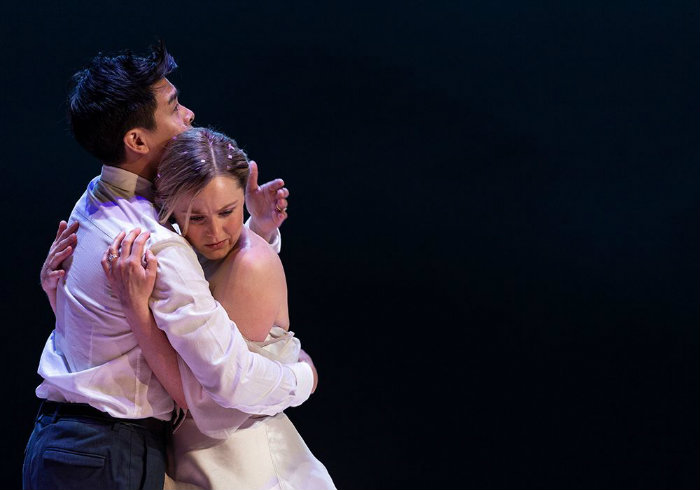
Gareth Yuen and Eryn Jean Norvill in Malthouse Theatre’s Melancholia. Photo credit: Pia Johnson.
GARETH YUEN
‘True reminders: do what you need to connect with the material, believe in the character and the world, go in and play, with a want to collaborate with who’s in the room, then…let it go. And something I strive for, is to really put it on the line, take risks. It doesn’t always happen, but if I can walk away having found something new and surprising, that’s the good stuff.’
Gareth Yuen is currently performing in Melancholia at Malthouse Theatre until 12 August.
PETER KOWITZ
‘Acting is one of the only professions where you have multiple job interviews a year, every year. But I’ve learnt that it doesn’t have to be the worst part of a job. It can even become something you look forward to. I admit occasionally there’s still times that I loathe auditioning, but it has become a much easier process than it once was… In fact more often than not I’ll enjoy it.
‘I wish I’d known that it’s not a competition and that a large percentage of it isn’t actually up to you. As long as you prepare as best you can, come in with a strong idea about the character, know your lines back to front and commit to the moment, the rest is not up to you. The casting agent or producer may want someone slightly shorter than you or with a different energy. Knowing that once you’ve auditioned it’s not up to you is liberating and you can leave it behind.
‘I’ve also learned (the hard way) to give my interpretation of the character. They’re seeing you in the first place because they believe that you as a human have something to offer. Give them your ideas, not what you think they want.
‘But my favourite piece of advice I learned from a Bryan Cranston interview. In it he said take the reins and transform your nerves into something positive, an excited energy, the same energy that you get when you watch someone unwrapping a present you’ve given them. Ironically, allowing yourself to feel this way will empower you and relax you.
‘There are always circumstance that mean an audition may not go as planned. But once it’s done, leave it behind. There will be another before you know it.’
Peter Kowitz is currently performing in the State Theatre Company of South Australia’s production of Creditors, in the Space Theatre until 5 August.
Related articles:
Read: Career spotlight: Casting director
Read: How to land an agent…and avoid the dodgy ones
Read: How to leverage rejection to fuel your arts career
Read: Is staying in the closet bad for your career?
